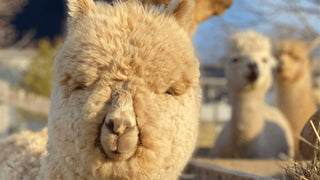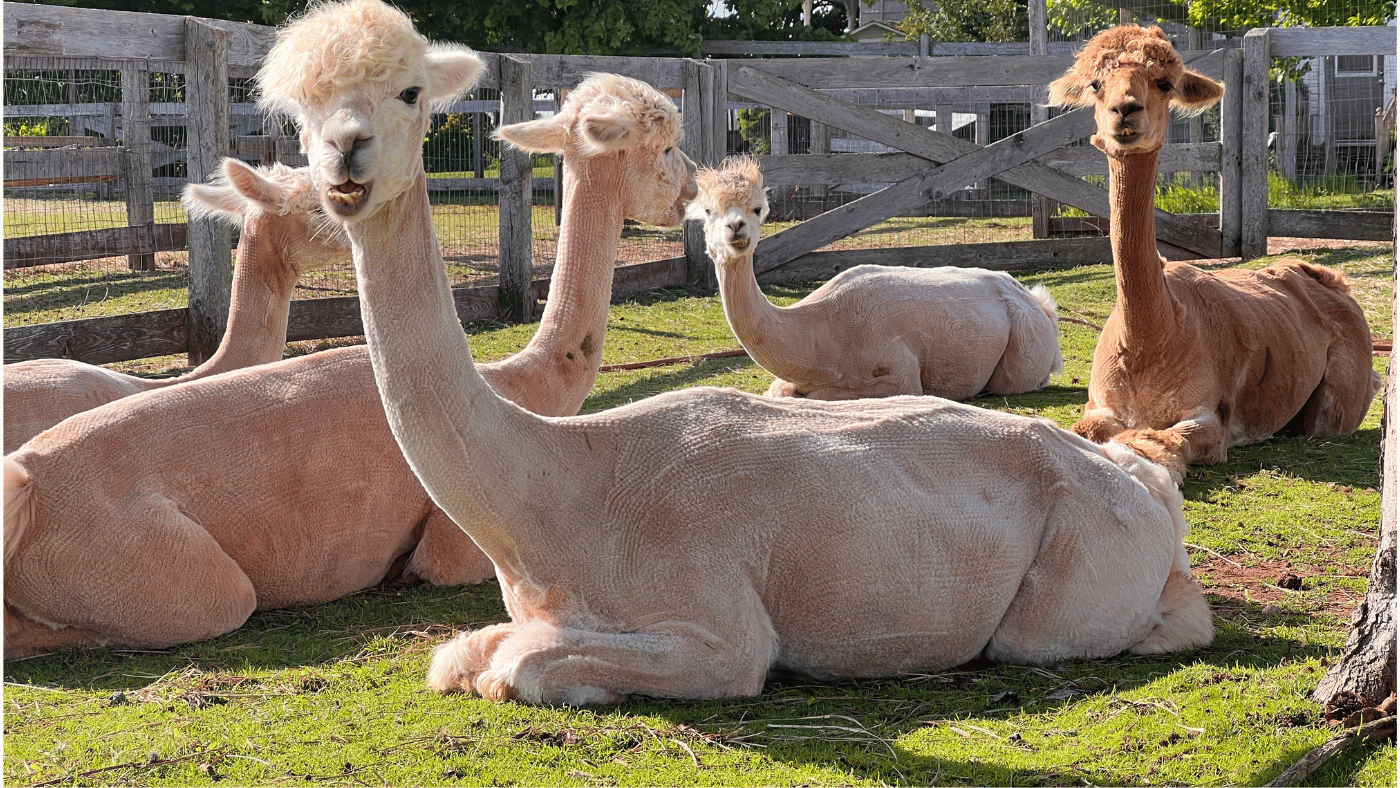Alpacas are Everywhere
Have you noticed? Alpacas and their camelid cousin, llamas seem to be very popular these days. And they seem to be printed on everything. Whether it's on a pair of pyjamas, a coffee mug, or a pair of souvenir socks, you can find just about any consumer good or apparel item sporting the distinctive silhouette or smiling face of our favourite South American animal.
Those adorable faces can be hard to resist; it's probably why I get dozens of enquiries a month from folks asking about bringing one home to join their own family. But before you pull a Phil Dunphy and surprise your modern family, there are a couple things you might want to consider.
Alpacas are Social Beasts
You can't have just one.
Like those tasty potato chips that seem to find their way into my grocery cart every week, you can never have just one alpaca. It's not that alpacas are just that addictive (although they can be). It's that alpacas are herd animals and they need to live with and among other camelids for them to feel safe and live long, healthy lives.
I recommend 3-5 as a minimum, with larger herds allowing them to feel safer. Oh, and you need to keep the females separate from the males (even the gelded ones) so you likely need to start with all of the same sex. Learn how to start your own alpaca farm.
Life Expectancy of Alpacas
Speaking of longevity, it's essential to consider the long-term commitment involved in bringing alpacas into your life. These charming creatures can live for 20 to 25 years, so welcoming them home means embarking on a lasting journey together.
As you plan for your future, consider theirs. It's worth thinking about how you can ensure a comfortable retirement for both yourself and your alpacas. Building a bond with these beauties isn't just a short-term affair – it's a lifelong partnership filled with love, care, and unforgettable moments.
Alpacas Need Spa Days
A good stylist is an alpaca's (and an alpaca owner's) best friend. Unlike most companion animal fur babies, alpacas do not shed or roo their fleece which means that they require annual shearing.
That fleece they are carrying continues to grow and is incredibly insulating and warm (have you ever worn alpaca socks in the dead of winter? Toasty!). This coupled with the warmer and more humid environment in our region compared to their native Andes mountains means that in the absence of shearing, heat stroke and heat stress can create significant health issues and even death.
Even with shearing, the heat and humidity in many parts of North America can sometimes cause heat related illnesses. In our neck of the woods, I recommend shearing in mid - late May to mid-June (ish). Oh, and good shearers can be hard to find on short notice, so make sure you book early.
Pro tip: That fleece can may some amazing products and can be a source of added income. Learn more about how alpca fibre is grade.

Spit Happens; Alpacas Just Can't Help Themselves
Yup, there will be spit. While the myth that alpacas and llamas spit at people is just that - a myth, it is true that they do spit - a lot! Spitting is actually a very important part of their communication system and they spit at one another. All. The. Time. It is their way of saying to one another, "Back off buddy, you're not respecting my space."
Every alpaca owner has been spit on at one time or another.....we just happen to get in their way when they are mad at one another (it usually happens at feeding time when they are attempting to claim all the food). But being spit on is different from being spit at. Rarely, are people the actual target of camelid spit. If you do happen to get spit at by an alpaca, that means you've either done something to deserve it or, that animal has been improperly socialized as a young'n and sees you as another member of its herd rather than the shepherd that you are. (More on that topic in another post).

They're Just Not Into You
Sorry folks, but they're just not that into you.
Don't take it personally, they're not really into being social with one another either. This one is the real kicker. How can an animal that looks so very cute and cuddly be so not huggable?
Sadly, alpacas and llamas are not generally affectionate animals. They have personal space issues and would mostly prefer not to be touched. They are very curious and will often come quite close. My favourite is when they come nose to nose and give me a big ole sniff. That's about the highest compliment in terms of trust that they can give me.
But touching? Mostly not. You can train them to tolerate touch and they will often accept it when they are preoccupied with yummy treats, but when those treats run out, typically so too does your touching opportunity. So if you're looking for something to cuddle, you might have to stick with alpaca teddy bears instead.
Summary
Alpaca ownership can be really fun and very rewarding, and the critters can bring immeasurable enjoyment. Over the years, we have found that folks who begin their alpaca journey with realistic expectations about the animal and their care, enjoy a greater sense of satisfaction and pleasure with the natural ups and downs inherent in any livestock or animal ownership.
If you would like to learn more, leave me a comment or ask a specific questions about alpaca ownership. If you happen to be in our area, consider taking a Behind the Scenes tour of our farm and you can meet all our critters up close and personal.
Questions & Answers
I've never farmed before; can I still own alpacas?
Alpacas are relatively easy to care for relative to other livestock. They do have some unique needs - find a established, experienced mentor to guide you.
Can I start with a breeding pair?
Start with a small group of same sex alpacas. Reach out to an established alpaca breeder before you start your own breeding.
Where can I find alpacas to purchase?
Reach out to your local alpaca association to find reputable breeders in your area.





